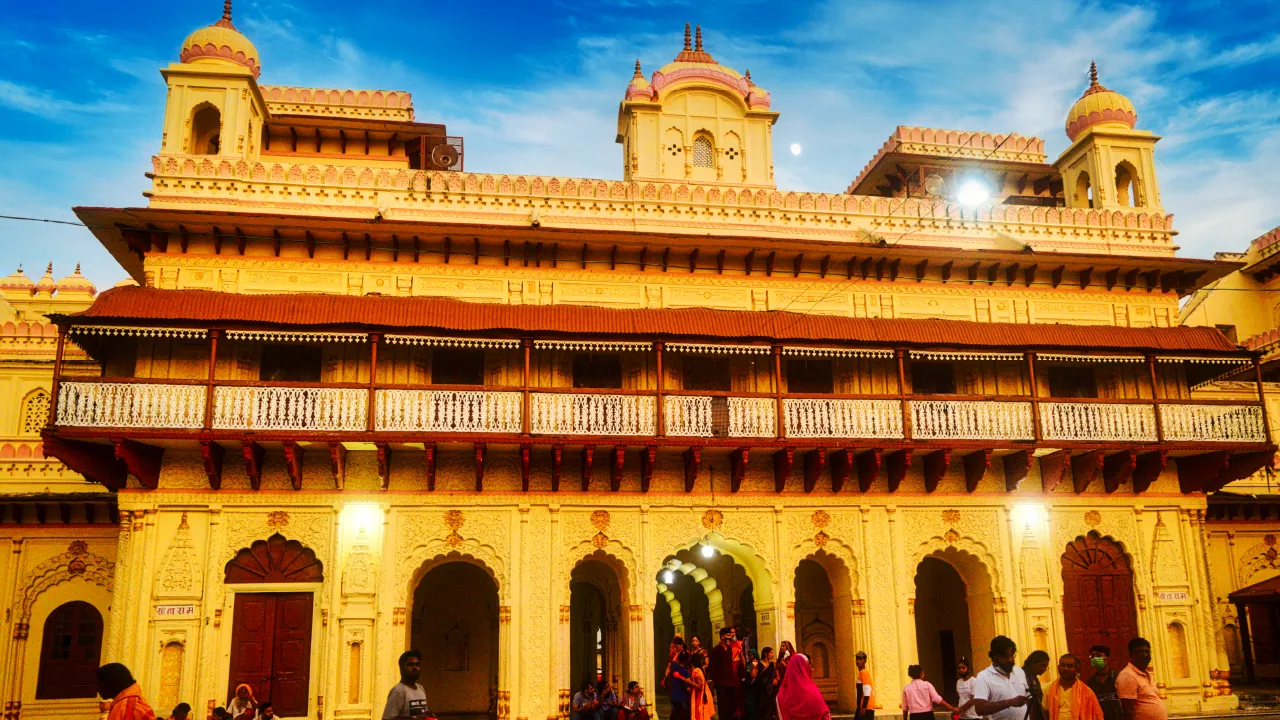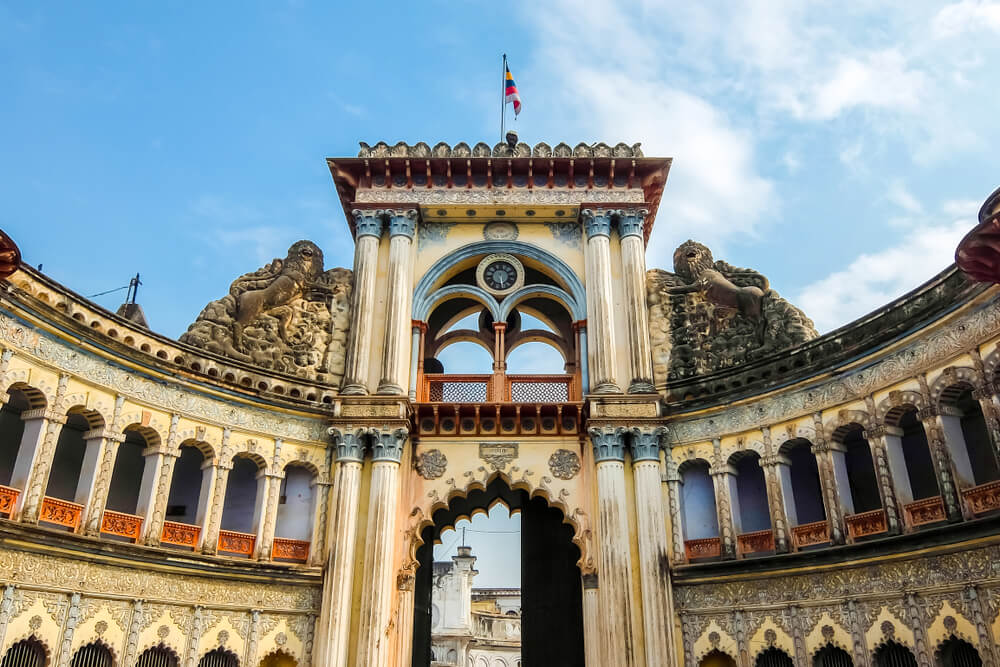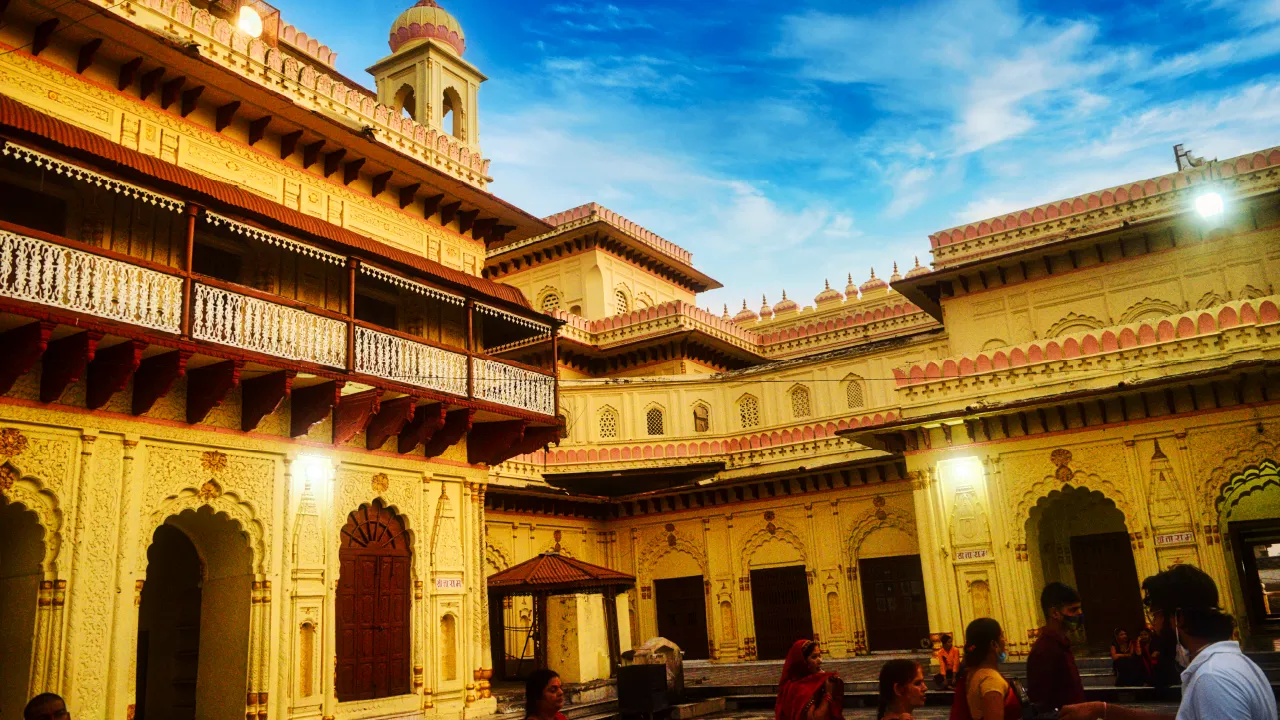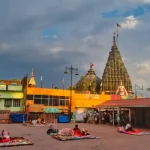Ram Mandir Opening Date: A Historic Moment in Ayodhya
Update: The Ram Mandir was successfully inaugurated on January 22, 2024. The temple is now open for public Darshan daily from 6:30 AM to 9:30 PM.
The highly anticipated opening date of the Ram Mandir in Ayodhya has been set for January 22, 2024. This event marks a significant milestone in India’s cultural and religious history, drawing attention from around the globe.

The Ram Mandir, also known as Sri Ram Janmabhoomi Mandir, is a testament to the enduring legacy of Hinduism and its profound impact on Indian society.
Construction and Financial Aspects of the Ram Mandir as the Opening Date Approaches
With the opening date of the Ram Mandir in Ayodhya fast approaching on January 22, 2024, it’s essential to examine the construction details and the financial contributions that have made this remarkable project possible.

This aspect not only highlights the architectural feat but also underscores the widespread support and enthusiasm for the temple’s realization.
Construction Excellence and Engineering Feats
The construction of the Ram Mandir is a notable engineering achievement, with the temple designed to withstand earthquakes up to a magnitude of 7.0. This feature illustrates the meticulous attention to safety and durability, ensuring that the temple will be a long-standing monument for future generations. The ongoing work on the first floor and the upcoming installation of the idol of Ram Lalla are significant milestones in this monumental project.
As we near the Ram Mandir opening date, the progress in construction reflects a blend of traditional craftsmanship and modern engineering techniques. This synthesis is vital in creating a structure that respects historical architectural styles while meeting contemporary standards.
Financial Contributions and Nationwide Support
The construction of the Ram Mandir has been largely driven by the generous contributions from individuals and organizations across India. Notably, President Ram Nath Kovind made a significant personal donation, reflecting the high level of official support for the project. By April 2021, an impressive ₹5,000 crore had been collected, demonstrating the immense public interest and backing for the temple.
The scale of donations and the involvement of nearly 150,000 activists in the fundraising efforts underscore the project’s national significance. The forthcoming Ram Mandir opening date marks not just the completion of a construction project, but the realization of a vision supported by millions.
Preparing for the Inauguration
As January 22, 2024, approaches, the final preparations for the Ram Mandir’s opening are underway. This involves not only the completion of the construction work but also the organization of inaugural events that will draw attention from across the country and beyond.

The temple’s inauguration is set to be a momentous occasion, reflecting the collective efforts and aspirations of countless individuals who have contributed to this endeavour.
Conclusion: A Collective Dream Realized
The opening of the Ram Mandir in Ayodhya is a culmination of years of planning, dedication, and generosity from people all over India. The temple’s construction is a testament to the power of collective effort and shared cultural values. As we near the opening date, the Ram Mandir stands as a symbol of unity and faith, a monumental achievement that resonates with millions of people.
Comprehensive Facilities and Infrastructure at Ram Mandir as the Opening Date Draws Near
As the Ram Mandir opening date of January 22, 2024, approaches, it’s important to highlight the extensive facilities and infrastructure that form part of the temple complex in Ayodhya. This expansion not only caters to the spiritual needs but also addresses the cultural, educational, and practical requirements of devotees visiting the temple.
The Historic Milestone
Key facts about the consecration ceremony
Multifaceted Temple Complex
The Ram Mandir complex in Ayodhya is an architectural masterpiece that goes beyond the main temple structure. It includes various facilities aimed at enriching the spiritual and cultural experience of visitors. Some key components of the complex include Shri Ram Kund, Yagyashala, Karm Kshetra, Anusthaan Mandap, and Hanuman Garhi.
Significantly, the temple complex houses the Guru Vashishtha Peethika, a centre dedicated to the study of Vedas, Puranas, Ramayana, and Sanskrit, thereby fostering educational and spiritual learning. The Bhakti Teela is designed as a peace zone for meditation, while the Tulsi Ramlila Center features a 360-degree theatre, enriching the cultural engagement of visitors.
As we near the Ram Mandir opening date, the focus is also on enhancing visitor facilities. These include banking and ATM services, public utilities along pathways, emergency medical aid, and a comprehensive visitor management system. The implementation of solar energy panels and the establishment of administrative offices further illustrate the modern, sustainable approach to the temple’s design.
Accessibility and Environment
Accessibility is a key consideration in the temple complex. Ramps for elderly devotees and well-planned pathways ensure that the temple is accessible to all. The environment-friendly design includes a three-level tree plantation to protect against seasonal dust and storms and the use of solar energy, reflecting a commitment to sustainability.
Security and Maintenance
With the anticipated influx of pilgrims, especially around the Ram Mandir opening date, security and maintenance are paramount.

The temple trust has made provisions for a security management complex and vigilance towers, ensuring the safety and well-being of visitors. These measures are crucial, considering the temple’s significance and the expected high volume of visitors.
Conclusion: A Holistic Approach to Devotion and Culture
As the opening date of the Ram Mandir in Ayodhya nears, the comprehensive facilities and infrastructure within the temple complex stand ready to welcome devotees from across the world. These facilities are not just about providing convenience but about creating an environment that enhances the spiritual journey of every visitor. The Ram Mandir, therefore, is not just a place of worship but a cultural and spiritual hub that caters to the diverse needs of its visitors.
Darshan Booking and Travel Information for Ram Mandir as the Opening Date Nears
With the opening date of the Ram Mandir in Ayodhya set for January 22, 2024, it’s important for devotees and visitors to know how to book darshan and travel to the temple. This information is crucial for those planning to be a part of this historic event.
Darshan Booking Process
As the Ram Mandir opening date approaches, the temple trust has made provisions for darshan bookings. This process allows individuals to experience the divine presence of Lord Ram in the newly inaugurated temple. To book darshan, devotees can visit the official temple website and follow the steps for reservation. This includes selecting a time slot and entering details such as the number of people. It’s essential to carry the token or confirmation for darshan on the day of the visit.
Accessing Ayodhya: Travel and Distances
For those travelling to the Ram Mandir, it’s important to know the distances from key locations and the available transportation options:
- From Varanasi: Approximately 220 kilometres by road.
- From Lucknow: About 140 kilometres, with convenient roadways and transportation options.
- From Faizabad: Adjacent to Ayodhya, making the Ram Mandir easily accessible within city limits.
- From Gorakhpur: Roughly 170 kilometres away.
- From Allahabad (Prayagraj): Situated at a distance of about 150 kilometres.
- From Delhi: Around 650 kilometres by road.
- From Agra: Approximately 350 kilometres away.
- From Kanpur: Around 210 kilometres distance.
These distances and the various modes of transportation available, such as buses, trains, and private vehicles, make Ayodhya accessible for visitors coming from different parts of India and beyond.
Preparing for the Inauguration Day
As the Ram Mandir opening date draws near, visitors are advised to plan their trip well in advance, considering the high influx of pilgrims expected.

Checking for updates on travel and accommodation options is recommended to ensure a smooth and fulfilling visit.
Conclusion: A Journey of Faith and Devotion
The upcoming inauguration of the Ram Mandir in Ayodhya is not just an event but a journey of faith and devotion for many. As January 22, 2024, nears, the preparation for darshan and the travel logistics are key aspects that devotees need to consider.
The temple’s opening will be a momentous occasion, and ensuring a well-planned visit will enhance the spiritual experience for every devotee.
Historical and Cultural Significance of the Temple
The Ram Mandir, located in the sacred city of Ayodhya in Uttar Pradesh, stands on a site that is deeply revered in Hindu mythology. Ayodhya, being the birthplace of Lord Ram, holds immense significance in Hindu tradition and is a pivotal character in the ancient epic, the Ramayana. The temple’s construction, therefore, is not just about erecting a structure, but about honoring a legacy that has shaped the cultural and spiritual fabric of India.
The temple’s design reflects the Nagara style of Hindu temple architecture, characterized by its distinctively beehive-shaped shikhara.
The complex is expansive, stretching over 380 feet in length and 250 feet in width, with the temple structure soaring to a height of 161 feet. The intricate details of the temple, including its 392 pillars and 44 doors, are a marvel of traditional craftsmanship and architectural ingenuity.
The Journey Towards Inauguration
The path to the Ram Mandir’s inauguration has been paved with various challenges and milestones, making the announcement of the opening date even more significant. The temple’s construction has involved skilled artisans and craftsmen, alongside the support of countless devotees who see this project as a fulfilment of a longstanding vision.

The temple not only symbolizes religious devotion but also represents a remarkable engineering achievement. Designed to withstand significant seismic activity, it is a fusion of ancient design principles and modern engineering. This blend of the old and the new is a fitting tribute to a temple that is rooted in millennia of history yet is poised to be a beacon for future generations.
Embracing the Spiritual and Cultural Renaissance
The inauguration of the Ram Mandir on January 22, 2024, is expected to be a grand event, reflecting the deep-seated devotion to Lord Ram. This occasion is not merely a ceremonial opening but a celebration of faith, culture, and shared heritage. It is an opportunity for people from diverse backgrounds to come together and experience the spiritual aura of Ayodhya, further solidifying its place as a significant pilgrimage destination.
The Ram Mandir opening date heralds a new era in Ayodhya, one where the spiritual and the historical converge, creating a space that is as much a sanctuary for devotees as it is a symbol of India’s rich and diverse cultural tapestry.
Architectural and Cultural Significance of the Ram Mandir as its Opening Date Approaches
As the opening date of the Ram Mandir in Ayodhya draws near, slated for January 22, 2024, it’s crucial to delve into the architectural and cultural significance of this majestic temple. This monumental structure is not just a place of worship but a symbol of India’s rich heritage and spiritual ethos.
Architectural Marvel Reflecting Ancient Traditions
The Ram Mandir, designed in the Nagara style, is an architectural marvel that pays homage to India’s ancient building traditions. This style is renowned for its ornate shikhara (spires) that symbolize the mythological Mount Meru, the cosmic centre of the universe in Hindu, Jain, and Buddhist cosmology. The temple’s layout and design reflect a deep understanding of Vastu Shastra, the ancient Indian science of architecture and construction.

Spanning 380 feet in length and 250 feet in width, with a soaring height of 161 feet, the temple’s dimensions are a testament to its grandeur and spiritual significance. The presence of 392 pillars and 44 doors within the temple is not just an architectural feature but also a symbolic representation of the many pathways to spiritual enlightenment in Hinduism.
Cultural Symbolism Embodied in Design
Every aspect of the Ram Mandir’s design is imbued with cultural symbolism, reflecting the stories and teachings of Hindu mythology. The temple’s walls are adorned with artwork depicting the life and journey of Lord Ram, providing devotees with a visual narrative of his teachings and virtues. This not only enhances the aesthetic appeal of the temple but also serves as a medium for imparting spiritual and moral lessons.
The temple complex’s design, which is representative of the Nagara style, is characterized by its emphasis on verticality, symbolizing the ascent to heaven or higher consciousness. This is particularly significant in Hinduism, where architectural designs often mirror the religion’s complex cosmology and philosophical concepts.
Preparing for the Inauguration
As the Ram Mandir opening date nears, the temple is being prepared to welcome thousands of devotees from across the world. This event is not just a celebration of a new religious site but a recognition of the temple as a new centre of cultural and spiritual life in India.
The inauguration is expected to be a convergence of various cultural elements, including rituals, music, and dance, celebrating the rich tapestry of Indian traditions.
Conclusion: A Landmark Event in Indian History
The upcoming opening of the Ram Mandir in Ayodhya is a landmark event in Indian history, representing years of devotion, planning, and craftsmanship. The temple’s architecture is a bridge between the past and the present, a physical manifestation of India’s enduring cultural legacy. As January 22, 2024, approaches, the Ram Mandir stands as a beacon of India’s architectural brilliance and its unwavering spirit of cultural preservation.
The astrologically calculated auspicious window (Sanjeevani Muhurat) for the Pran Pratishtha lasted only 84 seconds—from 12:29:08 PM to 12:30:32 PM—during which the idol was consecrated.
Inauguration Ceremony Details as the Ram Mandir Opening Date Approaches
As we approach the Ram Mandir opening date on January 22, 2024, the excitement and anticipation for the inauguration ceremony are palpable. This event is set to be a significant spiritual and cultural milestone, drawing devotees and dignitaries from across the globe.
The Grandeur of the Inauguration Ceremony
The Ram Mandir inauguration in Ayodhya promises to be an event of grand scale and spiritual profundity. The ceremony is expected to commence with a series of elaborate rituals, prayers, and festivities that encapsulate the rich cultural heritage and spiritual essence of Lord Ram. The atmosphere during the inauguration is anticipated to be vibrant with chants, hymns, and traditional rituals, creating a deeply spiritual ambience.
VVIP Attendance and Cultural Significance
The event is set to witness the presence of India’s Prime Minister, Narendra Modi, along with several other VVIP guests from India and abroad. This includes renowned figures from various fields, indicating the wide-reaching significance of the temple’s opening. The participation of such high-profile guests at the Ram Mandir inauguration underscores its importance as a historical and cultural event.
Preparations for the Influx of Devotees
With the Ram Mandir opening date nearing, the temple trust and local authorities are making extensive preparations to accommodate the expected large number of pilgrims. Measures are being put in place to ensure a smooth flow of devotees and to maintain order during the event.

The district administration is tasked with managing the significant influx of people, highlighting the logistical efforts involved in organizing such a large-scale event.
Commemorating a Historic Journey
The journey towards the construction and opening of the Ram Mandir in Ayodhya has been a long and significant one. The inauguration marks the culmination of years of planning, dedication, and collective effort. It is not just the opening of a temple but a celebration of a historical journey that has been followed and supported by millions.
Conclusion: A Landmark Event in Indian Religious History
The opening date of the Ram Mandir represents more than just the completion of a construction project; it signifies a momentous occasion in India’s religious and cultural history. As January 22, 2024, draws closer, the Ram Mandir is set to open its doors, marking a new chapter in the spiritual life of the nation and embodying the enduring legacy of one of Hinduism’s most revered deities.
Cultural and Spiritual Impact of the Ram Mandir as the Opening Date Nears
As the Ram Mandir opening date of January 22, 2024, approaches, it’s essential to reflect on the cultural and spiritual impact of this monumental event. The inauguration of the Ram Mandir in Ayodhya is more than just a ceremonial occasion; it represents a significant milestone in India’s religious and cultural landscape.
Spiritual Renaissance and Restoration of Faith
The opening of the Ram Mandir symbolizes a spiritual renaissance for many devotees. It signifies the restoration of faith and devotion among millions of followers of Lord Ram. This event is not just about the physical presence of a new temple but about the rekindling of spiritual values and principles that Lord Ram embodies. The Ram Mandir serves as a beacon of hope and unity, resonating with the spiritual aspirations of countless individuals.
Symbolizing Unity and Cultural Heritage
The inauguration marks a pivotal moment in preserving and celebrating India’s rich cultural heritage. The Ram Mandir, by virtue of its historical and mythological significance, brings together people from diverse backgrounds under the common banner of spirituality and devotion. As the opening date nears, the temple stands as a symbol of cultural unity and harmony, reflecting the pluralistic fabric of Indian society.
Global Recognition and Participation
The global recognition of the Ram Mandir’s inauguration is evident in the widespread interest and participation it has garnered. Devotees worldwide are expected to participate in the event, either by visiting Ayodhya or through digital platforms.

This international attention underscores the temple’s significance as a global spiritual destination and a symbol of India’s cultural influence.
Commemorating a Historic Journey
The journey towards the construction of the Ram Mandir has been a testament to unwavering faith and resilience. This journey, culminating in the upcoming opening date, highlights the collective efforts and determination of numerous individuals over the years. It stands as a reminder of the power of shared beliefs and the impact of collective action towards a common goal.
Conclusion: A Momentous Occasion in Indian History
The opening of the Ram Mandir on January 22, 2024, is not merely a structural achievement but a profound spiritual and cultural milestone. It embodies the spirit of devotion, unity, and cultural richness, resonating with millions who hold Lord Ram in high regard. The Ram Mandir’s inauguration is a momentous occasion, marking a new chapter in the tapestry of India’s religious and cultural narrative.
Honouring Tradition and Legacy as the Ram Mandir Opening Date Draws Near
With the Ram Mandir opening date scheduled for January 22, 2024, it is a time to honour the tradition and legacy that this temple represents. The inauguration ceremony is not just about unveiling a new structure; it’s a celebration of India’s rich cultural legacy and the historical significance of Ayodhya.
Embracing India’s Cultural Diversity
The Ram Mandir stands as a testament to India’s diverse cultural heritage. Its construction and upcoming inauguration are a reflection of the country’s long-standing traditions and religious practices. The temple serves as a reminder of the ancient stories and teachings that are integral to Indian culture, and its opening marks the continuation of these traditions into the modern era.
A Symbol of National Unity
As the Ram Mandir opening date approaches, the temple emerges as a symbol of national unity and communal harmony. It represents a collective spirit, bringing together people from various walks of life to celebrate a common heritage.
The temple’s inauguration is expected to be a moment where cultural and spiritual bonds are reaffirmed, highlighting the unifying power of shared religious and historical roots.
Global Recognition of a Cultural Landmark
The Ram Mandir’s inauguration is poised to receive global attention, signifying a pivotal moment in religious and cultural history. The event will likely attract international media, scholars, and devotees, further solidifying the temple’s status as a global cultural landmark.

This recognition reflects the universal appeal and significance of the temple, transcending national boundaries.
Reflecting on the Journey
The path to the Ram Mandir’s completion is a story of persistence and faith. As we near the opening date, it is a time to reflect on the efforts and dedication of countless individuals who contributed to making this vision a reality. The temple’s inauguration is a culmination of these efforts, marking a historic achievement in Indian religious and cultural history.
✨ Witness the History
The wait is over. Plan your pilgrimage to the newly inaugurated Ram Janmabhoomi. Our Ayodhya Spiritual Packages offer comfortable stays and guided darshan assistance.
- Accommodation in well-appointed hotels with comfortable amenities.
- Daily breakfast and dinner included.
- In-depth historical and cultural insights at each destination.
- 24/7 support and assistance throughout the tour.
Conclusion: Celebrating a Milestone in Indian Heritage
The upcoming opening of the Ram Mandir on January 22, 2024, is a celebration of Indian heritage and spirituality. It is an event that not only commemorates a new temple but also pays homage to the enduring legacy and traditions that have shaped Indian culture.
The inauguration of the Ram Mandir is set to be a momentous occasion, marking a new chapter in the rich tapestry of India’s religious and cultural narrative.
Experience the Spiritual Essence of Ayodhya with Prayag Samagam: As we eagerly await the grand opening of the Ram Mandir on January 22, 2024, join us at Prayag Samagam for in-depth coverage, exclusive updates, and enriching spiritual content.
Dive into the heart of devotion and heritage with our comprehensive articles, photos, and discussions. Don’t miss this once-in-a-lifetime event – stay connected with Prayag Samagam for your spiritual journey to Ayodhya’s Ram Mandir. Visit us to be part of this historic moment.
Ram Mandir Inauguration FAQs
Common questions about the historic event
Who inaugurated the Ayodhya Ram Mandir?
The Pran Pratishtha ceremony was performed by Prime Minister Narendra Modi, in the presence of RSS Chief Mohan Bhagwat and UP CM Yogi Adityanath.
Who sculpted the main idol of Ram Lalla?
The selected idol was sculpted by the renowned artist Arun Yogiraj from Mysuru, using black Krishna Shila stone.
Is the temple construction fully complete?
While the ground floor and the main sanctum (Garbhagriha) are open, construction on the upper floors and the spire (shikhar) is ongoing and expected to finish by 2025.
Can general public visit now?
Yes, the temple is fully open to the public. Millions of devotees visit monthly for Darshan.






















